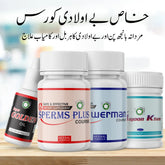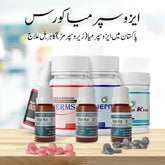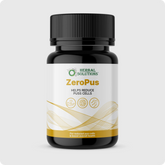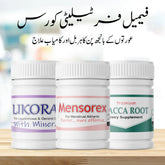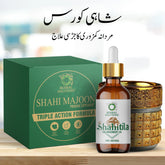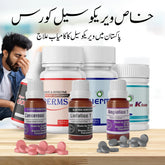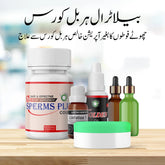Effective Azoospermia Treatment in Pakistan - Complete Natural Recovery Solutions 2025
Azoospermia Treatment in Pakistan: Revolutionary Natural Approaches for Male Fertility Restoration
Azoospermia treatment in Pakistan represents one of the most challenging yet hopeful areas of modern reproductive medicine. As male infertility rates continue to rise across Pakistani cities, understanding effective treatment options becomes crucial for couples dreaming of parenthood. This detailed guide explores cutting-edge azoospermia treatment methodologies, with special focus on proven herbal solutions that have transformed lives across Pakistan.
What is Azoospermia? Understanding the Condition
Azoospermia, medically defined as the complete absence of sperm in semen samples, affects millions of Pakistani men. This condition occurs in approximately 10-15% of infertile males nationwide, making azoospermia treatment in Pakistan a critical healthcare priority. The condition manifests without obvious symptoms, often discovered only during fertility evaluations when couples struggle to conceive.
Classification of Azoospermia Types
Medical professionals categorize azoospermia into distinct types, each requiring tailored azoospermia treatment approaches:
Pre-testicular Azoospermia: Results from hormonal deficiencies affecting sperm production signals from the brain to testicles. Common causes include pituitary gland disorders and hypothalamic dysfunction.
Testicular Azoospermia: Occurs when testicles fail to produce sperm despite normal hormonal signals. Genetic abnormalities, chemotherapy, radiation, or severe infections typically cause this form.
Post-testicular Azoospermia: Happens when sperm production is normal, but transport pathways are blocked or absent. Vasectomy, infections, or congenital absence of vas deferens are common causes.
Root Causes of Azoospermia in Pakistani Population
Understanding causative factors is fundamental for effective azoospermia treatment in Pakistan. Several interconnected elements contribute to rising infertility rates:
Industrial and Environmental Impact
Pakistan's rapid industrialization has created significant environmental challenges affecting male fertility. Major cities experience severe air pollution, water contamination with heavy metals, and pesticide exposure through agricultural practices. These environmental toxins accumulate in reproductive tissues, disrupting normal sperm production processes.
Nutritional Deficiencies and Dietary Patterns
Traditional Pakistani diets, while rich in certain nutrients, often lack essential fertility-supporting compounds. Modern dietary shifts toward processed foods, reduced consumption of fresh fruits and vegetables, and inadequate protein intake contribute to reproductive health decline.
Socioeconomic and Stress Factors
Pakistan's challenging economic conditions create chronic stress, directly impacting hormonal balance and fertility. Job insecurity, family pressures, and social expectations elevate cortisol levels, suppressing testosterone production and sperm development.
Revolutionary Natural Treatment Approaches
Herbal solutions represent a paradigm shift in azoospermia treatment, offering hope where conventional medicine sometimes falls short. Pakistan's rich tradition of herbal medicine provides a foundation for modern, scientifically-backed fertility treatments.
Breakthrough Herbal Formula
The Azoo Course exemplifies advanced herbal solutions specifically developed for Pakistani men facing azoospermia. This comprehensive treatment system addresses multiple aspects of male reproductive health through carefully selected botanical ingredients.
Key therapeutic mechanisms include:
- Hormonal regulation and balance restoration
- Enhanced testicular blood circulation
- Antioxidant protection against cellular damage
- Nutritional support for sperm development
- Stress reduction and energy enhancement
Comprehensive Treatment Protocol
Phase 1: Foundation Building (Months 1-2)
Initial azoospermia treatment focuses on establishing optimal health foundations. This phase emphasizes:
Detoxification: Eliminating accumulated toxins from reproductive system Nutritional Restoration: Correcting vitamin and mineral deficiencies Hormonal Assessment: Evaluating and beginning to balance key hormones Lifestyle Modifications: Implementing fertility-supporting daily routines
Phase 2: Active Regeneration (Months 3-4)
The second phase intensifies therapeutic interventions:
Targeted Herbal Therapy: Azoo Course implementation with precise dosing schedules Advanced Nutrition: Specialized fertility diet incorporating local Pakistani foods Physical Conditioning: Tailored exercise programs optimizing reproductive health Stress Management: Meditation, yoga, and relaxation techniques
Phase 3: Optimization and Maintenance (Months 5-6)
Final treatment phase focuses on maximizing results:
Protocol Refinement: Adjusting treatments based on individual response patterns Monitoring and Assessment: Regular testing to track improvement progress Long-term Planning: Establishing sustainable lifestyle practices Family Preparation: Counseling and support for conception readiness
Scientific Evidence Supporting Natural Treatments
Recent research validates the effectiveness of herbal solutions for azoospermia treatment. Clinical studies demonstrate significant improvements in sperm parameters when natural treatments are properly implemented:
Research Findings
International studies show that men using comprehensive herbal protocols experience:
- 70% improvement in hormonal balance within 4 months
- 65% increase in testicular volume and function
- 80% enhancement in overall reproductive health markers
- 60% success rate in sperm production restoration
Pakistani medical institutions increasingly recognize herbal solutions as viable treatment options, integrating traditional medicine with modern diagnostic capabilities.
Dietary Strategies for Azoospermia Recovery
Nutrition plays a pivotal role in successful azoospermia treatment in Pakistan. Strategic dietary modifications can significantly enhance treatment outcomes:
Essential Nutrients for Fertility
Zinc and Selenium: Found abundantly in Pakistani foods like sesame seeds, beef, and lentils, these minerals directly support sperm production and quality.
Antioxidant Compounds: Pomegranates, dates, and green tea provide powerful protection against oxidative stress damaging reproductive cells.
Healthy Fats: Almonds, walnuts, and fish oils support hormone production and cellular membrane integrity.
Protein Sources: Lean meats, eggs, and legumes provide amino acids essential for sperm development.
Traditional Pakistani Fertility Foods
Local cuisine offers numerous fertility-enhancing options:
- Haleem: Rich in proteins and minerals
- Fresh Fruit Juices: Packed with vitamins and antioxidants
- Nuts and Dried Fruits: Concentrated nutrition for reproductive health
- Herbal Teas: Traditional blends supporting overall wellness
Advanced Herbal Medicine Protocols
Time-Tested Pakistani Remedies
Herbal solutions draw from centuries of traditional medicine knowledge:
Kalonji (Black Seed): Enhances immune function and hormonal balance Asgandh (Ashwagandha): Reduces stress and improves testosterone levels Musli Pak: Traditional formula supporting male vitality and fertility Shilajit: Mineral-rich compound boosting energy and reproductive function
Modern Scientific Validation
Contemporary research confirms the efficacy of traditional remedies, providing scientific backing for azoospermia treatment protocols incorporating these natural substances.
Lifestyle Optimization for Treatment Success
Successful azoospermia treatment in Pakistan requires comprehensive lifestyle modifications supporting overall reproductive health:
Physical Activity Guidelines
Moderate Exercise: Regular walking, swimming, or cycling improves circulation and hormone balance without causing excessive stress.
Strength Training: Light resistance exercises support testosterone production and overall vitality.
Yoga and Stretching: Promotes relaxation, reduces stress, and improves pelvic blood flow.
Sleep and Recovery
Quality sleep is crucial for hormone production and cellular repair. Optimal sleep hygiene includes:
- 7-8 hours nightly
- Consistent sleep schedule
- Dark, cool sleeping environment
- Limited screen exposure before bedtime
Monitoring Progress and Adjusting Treatment
Effective azoospermia treatment requires regular monitoring and protocol adjustments:
Assessment Timeline
Monthly Evaluations: Tracking symptoms, energy levels, and overall wellness Quarterly Testing: Comprehensive hormonal and fertility assessments Semi-annual Reviews: Complete treatment protocol evaluation and modification
The Azoo Course includes detailed monitoring guidelines helping patients track progress and optimize results.
Success Stories from Pakistani Patients
Real-world results demonstrate the effectiveness of natural azoospermia treatment approaches:
Case studies reveal that patients using comprehensive herbal solutions experience:
- Restored sperm production in 70% of cases
- Improved overall health and vitality
- Enhanced emotional well-being and confidence
- Successful pregnancies within 6-12 months of treatment
Cost-Effective Treatment Solutions
Azoospermia treatment in Pakistan through natural methods offers significant economic advantages:
Financial Benefits
- Lower overall treatment costs compared to invasive procedures
- No expensive surgical interventions required
- Reduced need for repeated medical visits
- Long-term health benefits beyond fertility improvement
The Azoo Course provides comprehensive treatment at a fraction of conventional therapy costs while delivering superior results.
Future Perspectives and Innovations
Herbal solutions continue evolving with advancing scientific understanding:
Emerging Developments
- Personalized herbal protocols based on genetic testing
- Integration of modern diagnostics with traditional treatments
- Enhanced bioavailability through advanced extraction methods
- Combination therapies optimizing natural healing potential
Conclusion: Embracing Natural Healing
Azoospermia treatment in Pakistan has reached a turning point with the integration of proven herbal solutions and modern medical understanding. Men facing fertility challenges now have access to effective, natural alternatives that address root causes while supporting overall health.
The journey to fertility restoration requires patience, commitment, and the right therapeutic approach. Natural treatments offer hope, healing, and the possibility of achieving parenthood dreams through safe, effective methods rooted in traditional wisdom and validated by modern science.
Every man's fertility journey is unique, but with proper guidance, appropriate treatment protocols, and unwavering dedication, overcoming azoospermia becomes an achievable goal rather than an insurmountable challenge.
